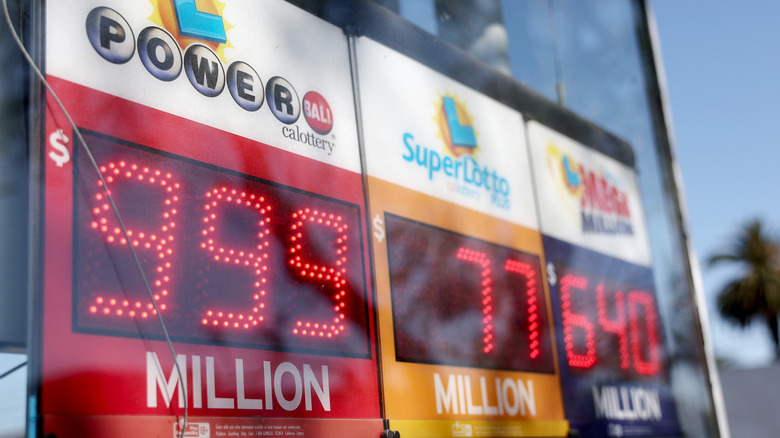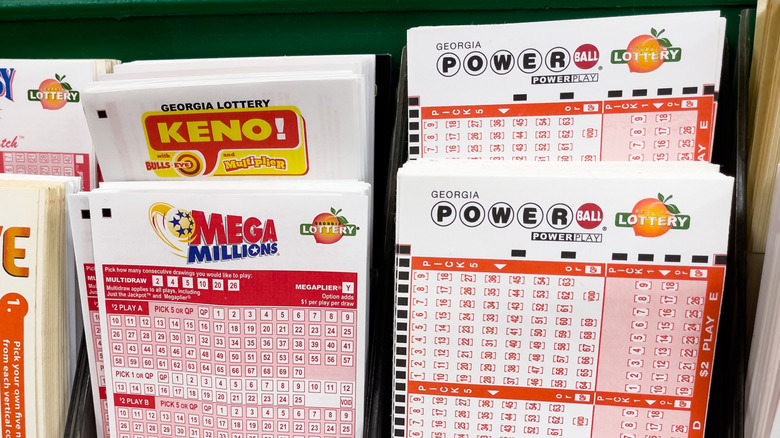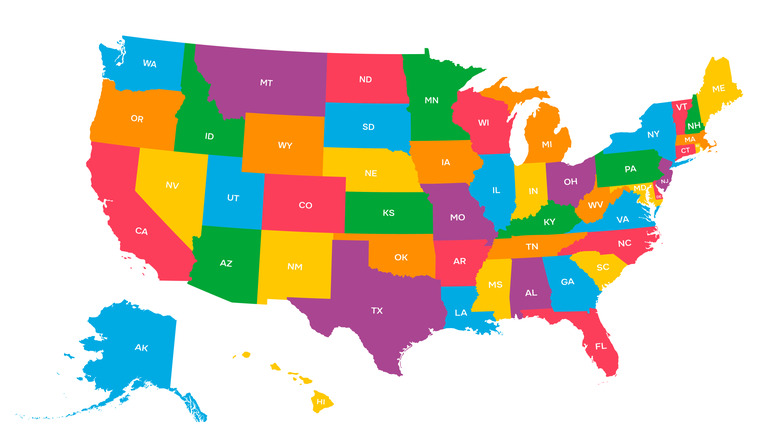These US States Have Never Sold A Winning Lottery Ticket
Nowadays, many states run their own lotteries to boost revenue for meaningful expenditures like infrastructure and education. Then there are the multi-jurisdictional lotteries such as Cash4Life and Mega Millions, the latter of which has actually had prizes go unclaimed. However, the grandaddy of all lotteries played across multiple states surely must be Powerball.
Every so often, when the Powerball jackpots grow to truly sensational levels, Americans are gripped by what can only be described as a mania for buying tickets. And it's no wonder. The largest Powerball prize of all time was $2.04 billion. Yes, billion. That tidy sum was captured in November 2022 by a single person in California. The next largest Powerball prize was $1.765 billion. Once again, the single winner was from California.
Currently, Powerball is played in 45 states, plus Washington D.C. and the U.S. territories of Puerto Rico and the U.S. Virgin Islands. If you're wondering which states don't participate in Powerball, they're Alabama, Alaska, Hawaii, Nevada, and Utah. Of the states which do play, players have the same 1-in-292.2 million probability to win regardless of where they're located. That said, some states definitely seem luckier than others. Although the two biggest Powerball winners ever (so far, that is) both hail from California, the Golden State actually ranks ninth-luckiest among states that play. Which begs the question: what are the most and least lucky states?
Four states never had a Powerball winner
With California established as the ninth-winningest Powerball state with 15 winners over the years, what are some of the higher-ranking states? The luckiest state in the union is Indiana, with a total of 39 winners at the time of writing in January 2025. Actually, the top three luckiest Powerball states are all located in the midwest. Following Indiana are Missouri with 31 winners and Minnesota with 22 winners.
Of the 45 states where you can play Powerball, only four have never had a winner. Without further ado, those unlucky states are North Dakota, Maine, Mississippi, and Wyoming. Although it's a territory, not a state, the U.S. Virgin Islands has also never sold a winning Powerball ticket.
Depending on how a player looks at the situation, a state may considered lucky for having many Powerball winners. Alternatively, some players feel that states which haven't had a winner — either ever or in a long time — are overdue to award a big jackpot. Those opinions might be subjective, but what's not open to interpretation are each state's tax consequences of winning the lottery, which we'll discuss next.
Certain states tax prizes more than others
From a tax perspective, the very best states to reside in if you're planning to win a big lottery prize are the eight states which don't tax lottery winnings at all: California, Florida, New Hampshire, South Dakota, Tennessee, Texas, Washington, and Wyoming. The five worst states in terms of lottery taxation are New York, New Jersey, Oregon, Minnesota, and Maryland. All of these states, plus Washington, DC, tax lottery winnings at rates between 8.95% and 10.90%.
Regardless of your state tax situation, know that Uncle Sam is going to take a cut of your winnings via federal income tax. Exactly how much you sacrifice to taxes may be impacted by whether you elect to receive your prize as an annuity or in one lump sum. For example, the estimated Powerball jackpot for January 25, 2025 offers a $46 million prize in the form of an annuity paid annually over the course of 30 years. If the winner wants one lump sum instead, that payout is $24.9 million.
For reference, the IRS taxes lottery winning at a flat 24%, plus any difference as dictated by tax brackets. Right now, the top bracket pays 37% federal income tax, so that would be 24% plus an additional 13% on any sizable lottery prize. Still, there are way worse situations to find yourself in than owing taxes on a giant prize.


